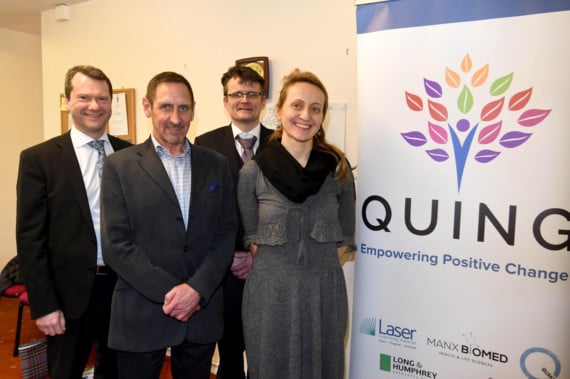Two mental health experts whose work has been celebrated in the UK have been in the island detailing how we can change our attitude to treating mental health.
Geoff Dennis, head of adult and older persons mental health services in Slough and Dr Natasha Berthollier, a charted psychologist, have been worked with the charity Quing, writes Sam Turton.
Together, their work as part of the team at Enabling Town Slough, has been highly commended in the UK for addressing inequalities in mental health and was praised by the UK Parliament during the launch of a UK wide co-operative looking at agencies working together to resolve mental health.
Their project in Slough, which has highlighted the importance of inclusive, person-centred care, also focuses on the role of voluntary bodies in the community.
So far, the project has led to savings of over £1,000,000 in bed spaces over two years.
We asked whether it would work in the Isle of Man. Mr Dennis certainly thinks so.
He told the Examiner ’there is certainly common ground between what we see in Slough and in the island’ in that both have seen an increase of demand on a stretched service in recent years.
’The delivery of mental health is changing in more creative ways,’ he said. ’So we have been challenging the power base of clinicians and giving people more agency to discover who they are.
’People need to have a real connection and feel valued - we can’t rely on a system to solve all our problems.’
Founder of Quing, Graham Clucas, said that the Enabling Slough team has been working with his charity over the past few months.
Quing focuses on community assets and aims to help those who are suffering from issues such as addiction, mental health and past criminality challenges.
Rather than seeking to manage or treat symptoms such as mental health problems and addiction, the Quing seeks to help people overcome these problems by growing what is already strong in a person’s life.
Mr Clucas said: ’They are ahead of us, as they have a foundation. But they get what we’re doing.
’Quing has been working with Natasha and Geoff from Enabling Town Slough (ETS) over the last six months to develop Quing’s mentor and therapeutic community into a recognised model that is similar to ETS.’
Mr Denis added: ’I felt quite sad about the similarities between where we were and where you [the island] are. Mental health services are working on, and not with, people. We need to challenge that thinking and that’s what community groups do.’
Dr Berthollier said that their whole strategy ’focuses on suicide prevention and giving people a sense of purpose and belonging’.
Rather than just being positive vibes and buzz words, their Enabling Town Slough work has delivered results that have delivered savings to the NHS.
Their work, which was celebrated by the National Positive Practice in Mental Health Awards in 2019, saw them work with 100 people, who had been reliant on mental health services, over two years.
In the year before the work, Dr Berthollier said that those patients had taken up a total of 4,700 bed days and cost the NHS over £1m.
As a result of their work, the figures fell to 312 days and a cost of just £100,000.
Chairman of Quing, Ralph Peake MHK (Douglas North) is a keen supporter of the community-based therapy offered by ETS and Quing and noted that Tynwald has recently supported the island embracing more community-based mental health treatment.
Mr Peake said in Tynwald that some people lack a support network and ’that is when they are directed to the professional services’.
He added: ’But the professional services are not always the best support for everybody; they are at different levels of their problems...
’The community has many strengths. We have heard concepts being spoken about in the past about asset-based community development, and it is about seeing what the community has got to offer and calling on those strengths to actually help other people, rather than always looking at the needs and weaknesses.’
Mr Denis said that their results and the island embracing the methods show an acceptance that ’the state can’t fix it all’.
Mr Clucas added: ’We are just trying to put capital back into people’s lives and grown them as a person rather than just treating symptoms of trauma.’
While in the island, Dr Berthollier and Mr Denis gave a presentation to Tynwald members and hosted workshops with members of Quing.
One of the women who attended the conference, told the Examiner that Quing had ’transformed my life’.
She added: ’I’d been using the Drug and Alcohol Team for over 20 years and been seen in mental health services for over 10 years. But after a friend recommended Quing, it has completely changed my life in the year I’ve been coming here.’
Another woman said that she had been ’reliant’ on the NHS for her medication and praised the way that sharing experiences with other people at Quing had ’helped me understand how to get clean’.
She also called for mental health to be better taught in schools to encourage people to talk and to ’know that you can make a difference to someone else’.
One woman who asked to speak to us said that a family member had told her about Quing after the help it gave them.
Tragically, she lost that family member, but said that Quing had ’helped me understand more’ and that medication is ’only giving people a short-term fix, but the trauma is still there’.
A former soldier with PTSD said that in the 18 months he had been attending Quing he had ’done a lot of work on myself’.
He added: ’I felt that mental health services misdiagnosed me but Quing helped me recognised my strengths and overcome preconceptions of my condition,
’It helped that I’ve been able to bring friends along too and learned to let go and focus on my strengths.’
Quing is holding a one-day conference next month, opened by its chairman Mr Peake.
Mr Clucas said the conference also hopes to attract professionals in the public and third sectors ’with a focus on innovation, best practice and policy development’.
Speakers confirmed so far include Professor David Best, who is a professor of criminology at the University of Derby and Mr Denis will also be returning to talk.
The conference is on March 6. Register at https://www.eventbrite.co.uk/e/from-recovery-to-discovery-tickets-89978148063.


.jpeg?width=209&height=140&crop=209:145,smart&quality=75)
.jpeg?width=209&height=140&crop=209:145,smart&quality=75)
.png?width=209&height=140&crop=209:145,smart&quality=75)
Comments
This article has no comments yet. Be the first to leave a comment.